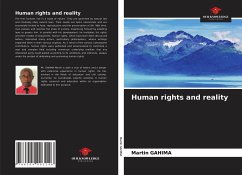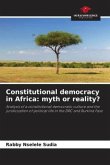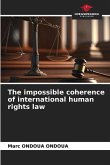The first humans live in a state of nature. They are governed by natural law and intuitively obey natural laws. Their needs are basic necessities and are essentially limited to food, reproduction and the preservation of life. With time, man evolves and reaches the state of society, organising himself by adopting laws to govern him. In parallel with his development, he multiplies his rights and their modes of enjoyment. Human rights, which had never been discussed before, interested many actors, particularly philosophers, whose writings explained them in their various aspects. As a result of the various subsequent contributors, human rights were published and universalised to constitute a vast and complex field including numerous underlying realities that any interested party could exploit according to its ambitions and interests, always under the pretext of defending and promoting human rights.
Bitte wählen Sie Ihr Anliegen aus.
Rechnungen
Retourenschein anfordern
Bestellstatus
Storno








